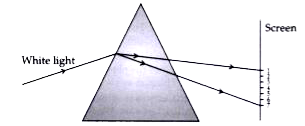When light falls on a prism, the resultant can be
inversion
magnification
elongation
deviation
The correct Answer is:D
Step by step video, text & image solution for When light falls on a prism, the resultant can be by Physics experts to help you in doubts & scoring excellent marks in Class 12 exams.
Updated on:21/07/2023Topper's Solved these Questions
- EXPERIMENTAL PHYSICSBook:NARAYNAChapter:EXPERIMENTAL PHYSICSExercise:Level-v(Single answer)
Explore 23 Videos
- EXPERIMENTAL PHYSICSBook:NARAYNAChapter:EXPERIMENTAL PHYSICSExercise:Multiple answer
Explore 6 Videos
- ELECTROSTATICS AND GAUSS LAWBook:NARAYNAChapter:ELECTROSTATICS AND GAUSS LAWExercise:Intergers type question
Explore 11 Videos
- MAGNETISMBook:NARAYNAChapter:MAGNETISMExercise:LEVEL-II (H.W)
Explore 24 Videos
Similar Questions
Dispersion process forms spectrum due to white light falling on a prism. The light wave with shortest wavelength :
View SolutionA beam of white light falling on a glass prism gets split into seven colours marked 1 to 7.

Light of colour of chilli powder bends the most while the light of colour of brinjal bends the least. Is the statement correct?
View Solution
Knowledge Check
When light falls on matter, it can produce
Amechanical effect onlyBchemical effect onlyCheating effect onlyDall the aboveDispersion process forms spectrum due to white light falling on a prism . The light wave with shortest wavelength :
Arefracts the mostBdoes not change the pathCrefracts the leastDis reflected by the side of the prismWhen light falls on semiconductors, their resistance
AdecreasesBincreasesCdoes not changeDcan't be predicted
What happens when light falls on the retina ?
View SolutionA beam of white light falls on a glass prism. The colour of light which undergoes the least bending on passing through the glass prism is :
View SolutionWhen a ray of light falls on a prism of angle 48∘ , it suffers minimum deviation. Refractive index of the material of prism is 1.6. The angle of incidence is nearly
View SolutionWhen light rays are incident on a prism at an angle of 45∘, the minimum deviation is obtained. If refractive index of material of prism is √2, the angle of prism will be
View SolutionWhen light rays are incident on a prism at an angle of 45∘, the minimum deviation is obtained. If refractive index of the material of prism is √2, then the angle of prism will be
View Solution